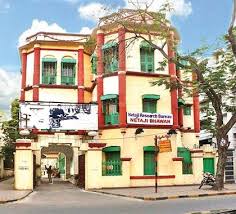Netaji Bhawan: The Legacy of Subhas Chandra Bose
Netaji Bhawan, also known as Netaji Subhas Chandra Bose House, is a historical landmark in Kolkata that commemorates the life and legacy of one of India’s most revered freedom fighters, Subhas Chandra Bose. This ancestral home of Bose is a testament to his indomitable spirit and relentless pursuit of India’s independence. Today, it serves as a museum and research center, attracting history enthusiasts and admirers of Bose’s heroic legacy.
Historical Background
Netaji Bhawan was the residence of Subhas Chandra Bose and his family. Bose, a prominent figure in India’s struggle for independence, used this house as his base of operations. It was from here that he famously escaped house arrest in 1941, embarking on a daring journey that would eventually take him to Germany and Japan to seek support for India’s freedom movement. The house was converted into a museum in 1961 by the Netaji Research Bureau, established by Bose’s nephew Sisir Kumar Bose.
Exhibits and Collections
- Personal Artifacts: The museum houses an extensive collection of Bose’s personal belongings, including his uniforms, letters, photographs, and other memorabilia. These artifacts provide a glimpse into his personal life, his role in the independence movement, and his interactions with global leaders.
- The Escape Car: One of the most notable exhibits is the Wanderer car that Bose used during his great escape from house arrest. This car symbolizes Bose’s daring and resourcefulness, capturing a pivotal moment in his life.
- Historical Documents: The museum holds a rich archive of historical documents, including correspondences, speeches, and writings by and about Bose. These documents offer valuable insights into his strategies, ideologies, and contributions to the freedom struggle.
- Photographic Display: A comprehensive photographic display chronicles Bose’s life, from his early years to his revolutionary activities and leadership of the Indian National Army (INA). The photographs also highlight his international travels and the support he garnered from various quarters.
- Library and Research Center: The Netaji Research Bureau operates a library and research center within Netaji Bhawan. Scholars and researchers can access a wealth of resources related to Bose’s life and the broader context of India’s independence movement.
Cultural and Historical Significance
- Patriotism and Inspiration: Netaji Bhawan stands as a symbol of patriotism and the undying spirit of India’s freedom fighters. It inspires visitors with Bose’s courage, determination, and visionary leadership.
- Educational Value: The museum serves as an educational hub, offering deep insights into the history of India’s struggle for independence. It educates visitors about Bose’s contributions and the broader historical context of his time.
- Preservation of Heritage: By preserving and showcasing Bose’s legacy, Netaji Bhawan plays a crucial role in keeping the memory of his contributions alive for future generations. It ensures that his sacrifices and achievements are not forgotten.
- Community Engagement: The museum engages with the community through various programs, including lectures, exhibitions, and cultural events. These initiatives foster a sense of pride and awareness about India’s rich historical heritage.
Visitor Experience
- Guided Tours: Visitors can take guided tours of the museum to gain detailed insights into Bose’s life and legacy. Knowledgeable guides provide contextual information and share interesting anecdotes, enhancing the overall experience.
- Interactive Exhibits: The museum features interactive exhibits that allow visitors to engage with the displays in a more immersive manner. Audio-visual presentations and touch-screen interfaces bring Bose’s story to life.
- Special Exhibitions: Netaji Bhawan regularly hosts special exhibitions that focus on specific aspects of Bose’s life or broader historical themes. These exhibitions provide a fresh perspective and attract repeat visitors.
- Souvenir Shop: The museum has a souvenir shop where visitors can purchase books, memorabilia, and other items related to Bose and the independence movement. These souvenirs serve as keepsakes and educational resources.
Accessibility and Visitor Information
- Location: Netaji Bhawan is located at 38/2, Lala Lajpat Rai Sarani, Kolkata, West Bengal, India.
- Visiting Hours: The museum is open to visitors from Tuesday to Sunday. It is advisable to check the specific opening hours and any scheduled events in advance.
- Entry Fee: There may be an entry fee for visitors. Detailed information about fees and regulations can be obtained at the entrance or through the museum’s official website.
- Accommodation: Various accommodation options are available near Netaji Bhawan, ranging from budget hotels to luxury lodges. Visitors can choose based on their preferences and convenience.
Conclusion
Netaji Bhawan is more than just a museum; it is a shrine dedicated to one of India’s greatest freedom fighters, Subhas Chandra Bose. Its extensive exhibits, rich historical collections, and educational programs make it a must-visit destination for anyone interested in India’s independence movement and Bose’s extraordinary life. Whether you are a history enthusiast, a student, or a curious traveler, a visit to Netaji Bhawan promises an inspiring and enlightening experience.






Leave feedback about this